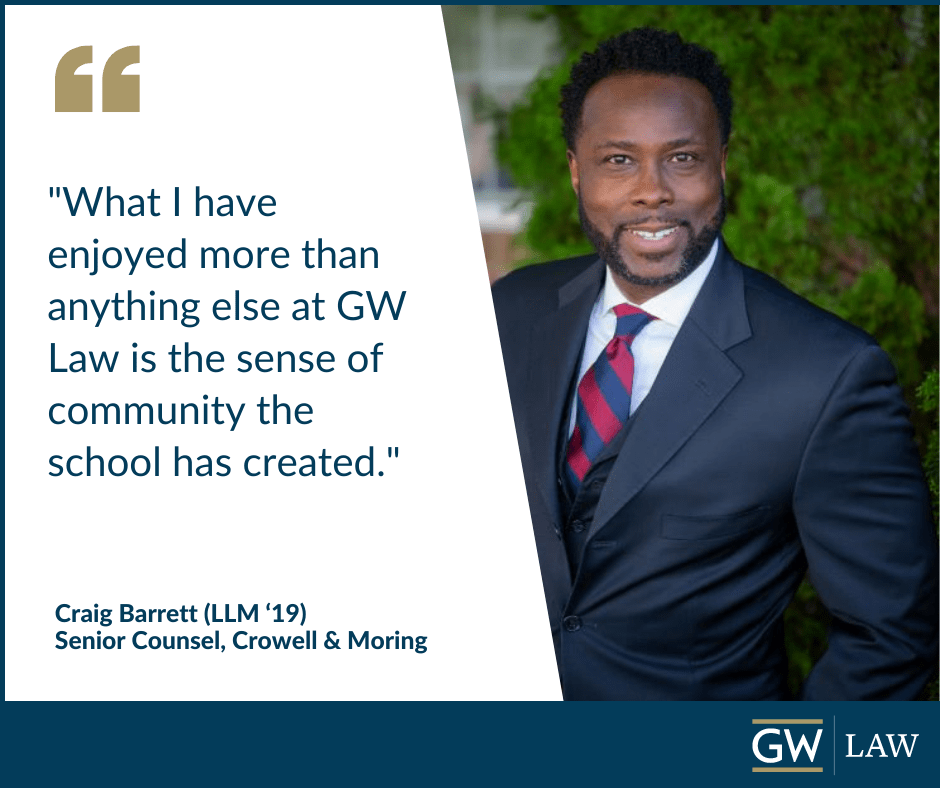Craig Barrett (LLM ’19) is a Senior Counsel at Crowell & Moring and the professor of our Cost & Pricing course. We were thrilled to chat with Craig about his experience as a student at GW Law and his work at Crowell. He also shared some helpful advice for students who may be apprehensive about enrolling in Cost & Pricing.

INTERVIEW WITH CRAIG BARRETT
Thanks for taking the time to speak with us. Please tell us how you became interested in the government contracts field?
I became interested in government contracts around 2009 when I was working with the
Department of the Defense, Office of General Counsel. In that position, I was assisting the
Department of Justice on defending the Habeas Claims of the Detainees in Guantanamo Bay Cuba. I heard a news segment about government procurement on the radio, which made me interested in learning more about the subject. The following year, I took a nonlegal position as an Acquisition Operations Manager at Marine Corps Systems Command, the acquisition arm of the Marine Corps. I got a perspective of the procurement process through the eyes of the Program Manager of the issuing agency. After that, I became agency counsel with the U.S. Government Publishing Office as their
government contracts attorney.
You are an alum of the law school – what made you decide to pursue your LLM in Government Procurement from GW Law?
I became interested in GW’s LL.M. in government procurement law in 2016 when I
started as agency counsel with the U.S. Government Publishing Office. One of my
mentees at the time, who was a third-year law student at GW, introduced me to GW Law’s
Government Procurement Law Program. I learned about the Program and its course
offerings and realized the value the Program could add to my new role as agency counsel
at the U.S. Government Publishing Office. I also learned about the GW Law Government
Procurement community through my mentee.
Tell us about your experience at GW Law School?
What I have enjoyed more than anything else at GW Law is the sense of community the
school has created. I treasure the opportunity to speak with current students, recent
graduates, and long-time alumni — I immensely appreciate facilitating connections within
my network, assisting others in getting employment opportunities, and sharing ideas and
“war stories” with former classmates and alumni located in the continental U.S. or outside
of the continental U.S. Our collective power transcends anything we can accomplish
individually. The government procurement community and bar can advance the practice
further through our cooperation and support. Every member of the GW Law community I
have encountered represents this philosophy.
Could you please tell us about your role as a senior counsel in the Government Contracts Group in Crowell & Moring’s Washington, D.C. office?
I am currently a senior counsel in the government contracts practice group at Crowell &
Moring. Although I have worked on matters for the firm’s larger clients, I focus my
practice on providing advice and counsel to minority and veteran owned small businesses
who seek to do business with the government. I also work on matters for clients that
leverage distributive ledger technology and blockchain technology. Crowell supports my
efforts to make legal resources available to minority owned companies, is committed to
diversity and inclusion, and actively targets and supports minority owned companies. As a
result, Crowell has diversely staffed matters when providing this support, what pundits call
a “win/win.”
Could you please tell us about the course you teach – Cost & Pricing – and how this course will prepare our students for practice in the government contracts field?
Cost & Pricing (Law 6506) is a two-credit foundational course in the Government Procurement Law Program that is offered on-line in the fall and spring semesters. Government contracts practitioners will likely face issues surrounding cost and pricing in their practice. This is because all contractors, large or small, want to lower costs, increase profits, and be compliant with the statute and regulations surrounding cost and pricing. So, all students who intend to pursue a career in government procurement should become familiar with this area of law.
This class covers the basic legal framework, such as cost and pricing regulations contained in the Federal Acquisition Regulation (FAR), cost accounting standards (CAS), case law, treatises, and government manuals and guidance. We then build off this foundation to help students understand and tackle real-life issues facing contractors, such as a Request for Equitable Adjustment, questions regarding allowable costs, and a termination proposal.
The course consists of pre-recorded lectures that can be viewed at the students’ convenience and practical application exercises. The practical application exercises consist of in-class assignments and scenario-based case studies. The course also has students who are at different stages of their professional careers and from a variety of industries. So, the students benefit from the experiences and perspectives of a diverse student population.
By end of the course, students should feel comfortable tackling common cost and pricing issues that contractors face.
“At bottom, Cost & Pricing is like any other government contracts class. Students learn the foundational legal framework, such as applicable case law, relevant FAR provisions, and standards, i.e., CAS, and learn how to apply the law to various factual scenarios that are common to contractors.”
CRAIG BARRETT
It’s no secret that many students are hesitant to take Cost & Pricing because they think it is more challenging than other courses and involves math. What words of encouragement or advice would you give law students who express these concerns?
Although students will make calculations in the course, students need only have a mastery of grade-school math to excel. Students will not engage in complex mathematics. At bottom, Cost & Pricing is like any other government contracts class. Students learn the foundational legal framework, such as applicable case law, relevant FAR provisions, and standards, i.e., CAS, and learn how to apply the law to various factual scenarios that are common to contractors. Additionally, cost & pricing is a critical area of law that contractors will need assistance with and an area of law that touches upon other government contracts practices. So, students should not hesitate to take this course, which will help them gain a complete picture of the foundational issues in government contracts.
What have you enjoyed most about teaching at GW Law?
What I enjoy the most about teaching are the students, who have diverse backgrounds and professional experiences. I have taught seasoned contracting officers, agency counsel, law firm practitioners, auditors, and contract professionals from private companies. Their diverse professional backgrounds enrich class discussions and provide unique perspectives and approaches to common issues or problems. Students learn from each other’s experiences in addition to the foundational concepts covered during the course.
What advice would you give a student considering a career in government contracts?
I would advise students to continue to build their professional network and nurture those relationships because they may be the source of their next professional opportunity.
What advice would you give a student who wants to counsel on cost & pricing issues?
First, they should take my class in Cost & Pricing; second, attend as many programs offered on the subject to hear practitioners speak about the various issues in the context of their practice. This will make the subject more accessible and less abstract.

